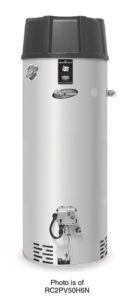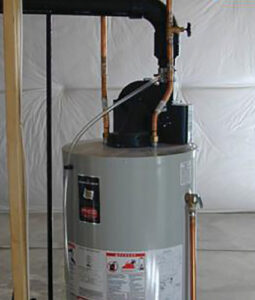
A power vent water heater is a popular choice for many homeowners due to its energy efficiency and ability to be fixed in various locations. However, one common issue that could arise with these units is excessive noise. If you’re experiencing loud noises coming from your power vent water heater, don’t worry! We will explore the causes and “How To Reduce Noise From Power Vent Water Heater” in this comprehensive guide.
There are quite numerous and effective methods that can be used to reduce noise from a power vent water heater. Those methods are as follows:
- Install anti-vibration pads.
- Consider soundproofing the area.
- Insulate the vent pipes.
- Add mufflers.
- Schedule regular maintenance.
By implementing these techniques, you can enjoy a quiet and peaceful environment in your home while benefiting from the convenience of a power vent water heater.
Contents
How To Reduce Noise From Power Vent Water Heater
Install anti-vibration pads
One of the methods that are best to reduce noise from a power vent water heater is by installing anti-vibration pads. Installing anti-vibration pads involves placing specially designed pads beneath the power vent water heater.
These pads are made of materials that absorb and dampen vibrations, such as rubber or neoprene. By placing the pads strategically under the water heater, they act as shock absorbers, reducing the transfer of vibrations to the surrounding area.
This helps to minimize noise caused by the unit’s operation, such as motor vibrations or rumbling sounds. The anti-vibration pads create a cushioning effect, effectively isolating the water heater from the floor or any other surface it is in contact with.
This method is relatively simple and can significantly reduce the noise generated by the power vent water heater, providing a quieter and more comfortable environment.
Consider soundproofing the area
Another effective method is by soundproofing the area of the power vent water heater. Applying acoustic panels, foam insulation, mass-loaded vinyl, seal air gaps, furniture arrangement, or carpets and rugs could help to reduce the noise coming from your power vent water heater.
As you know, acoustic panels are designed to absorb sound waves and prevent them from bouncing off hard surfaces, thereby reducing noise reflections. Install these panels on the walls, ceiling, or any other exposed surfaces near the water heater.
They are typically made of sound-absorbing materials like foam or fiberglass and come in various sizes and designs to suit different aesthetics. If you choose foam insulation, applying it to the walls, ceiling, or other surfaces can help dampen noise.
Acoustic foam or specialized soundproofing foam absorbs sound vibrations and reduces echoes. It can be easily attached to the targeted areas using adhesive or nails. Additionally, foam weatherstripping can be applied around doors or windows to minimize sound leakage.
Whichever of the soundproofing materials you choose will do a great job at soundproofing the surroundings of the power vent water heater.
Also Read: How to Make a gas golf cart quieter
Insulate vent pipes
Aside from installing anti-vibration pads or soundproofing the water heater area, insulating the vent pipes can help reduce noise from the power vent water heater.
Power vent water heaters rely on vent pipes to expel combustion gases. These pipes can transmit sound vibrations, resulting in noise within your home.
Insulating the vent pipes with soundproofing materials, such as foam or rubber, can help absorb the vibrations and reduce noise transmission. Ensure the insulation does not obstruct the venting system or interfere with the unit’s operation.
Add mufflers
Adding mufflers to the venting system provides an additional layer of noise reduction by disrupting the airflow and dissipating sound energy.
They are designed with internal baffles or sound-absorbing materials that help reduce noise levels without compromising the venting efficiency of the water heater.
Mufflers are particularly beneficial in minimizing the noise generated by the airflow and combustion gases as they exit the venting system.
It’s important to note that the installation of mufflers may require professional expertise, especially if it involves modifications to the venting system.
Consulting with a qualified technician or following the manufacturer’s guidelines is crucial to ensure proper installation and maintenance.
Schedule regular maintenance
Maintenance is a vital instruction that must be done when using products like a power vent water heater. This helps to prevent grime, dust, rusting, and other unwanted things that can cause a machine to malfunction or produce unwanted noise.
Arrange for routine maintenance of the water heater to identify and address any potential issues before they become noisy problems.
What causes a power vent water heater to make noise?

A power vent water heater can make noise due to various factors. Here are some common causes of noise in power vent water heaters:
Vibrations
Vibration refers to the rapid oscillating movement of an object or component, typically resulting from the generation of mechanical energy. In the context of a power vent water heater, vibrations can occur due to various factors, including the operation of internal components and the interaction between the water heater and its surroundings.
The operation of the water heater’s components, such as the blower motor, burner assembly, or circulating pumps, can generate vibrations. These vibrations can cause rattling or buzzing noises if the components are not securely fastened or if there are loose connections.
Excessive vibration in a power vent water heater can lead to increased noise levels and potential long-term issues. It is important to address vibrations to maintain the efficiency and longevity of the water heater.
Some methods to mitigate vibrations include tightening loose connections, securing components properly, ensuring proper installation on a stable surface, and adding vibration-absorbing materials such as anti-vibration pads.
If vibrations persist or become a significant concern, it is recommended to seek professional assistance to diagnose and resolve the underlying causes.
Venting system issues
Venting system issues can contribute to noise problems in a power vent water heater. The venting system is responsible for removing combustion gases produced by the water heater’s burner and expelling them safely outside.
When there are problems with the venting system, it can result in unusual noises. Here’s a more detailed explanation of venting system issues:
- Obstructions: Blockages or obstructions in the vent pipes can impede the flow of exhaust gases and disrupt the proper functioning of the water heater. Common obstructions include debris, bird nests, or accumulated dirt. These blockages can cause the water heater to produce unusual noises as the gases struggle to exit the system. Additionally, if the vent cap at the termination point of the vent pipe is damaged or not securely attached, it can create noise, such as whistling or rattling.
- Improper Venting Design: A poorly designed venting system can contribute to noise issues. If the vent pipes are not correctly sized, have excessive bends, or lack proper clearances, it can result in restricted airflow or turbulence. This can lead to increased noise levels as the gases struggle to flow smoothly through the venting system.
- Vent Pipe Material: The material used for the vent pipes can also affect noise levels. Different materials have varying acoustic properties, and some materials may naturally transmit more noise than others. For example, metal vent pipes may generate more audible vibrations or resonances compared to insulated or lined pipes. If you suspect issues with the venting system of your power vent water heater, it is advisable to consult a qualified technician or HVAC professional. They can inspect the venting system, identify any problems, and make the necessary repairs or adjustments to ensure proper functioning and reduce noise.
Expansion and Contraction
Expansion and contraction could also be a reason why a power vent water heater makes noise.
As the water heater heats and cools during its operation, the metal components expand and contract. This thermal expansion and contraction can create popping or cracking noises as the materials adjust to temperature changes.
Sediment Buildup
Talking about sediment buildup, it is one culprit that causes a machine to malfunction. This is why regular maintenance was advised in the methods provided to reduce noise from a power vent water heater.
Over time, mineral sediment can accumulate at the bottom of the water tank. When the burner ignites, it can cause the sediment to shift or rattle, resulting in noise. This is more common in older or poorly maintained water heaters.
Water Flow Noises
Also, water flow noises could be a factor that causes noise from a power vent water heater. Noise can occur due to the movement of water through the pipes and fittings.
This can be caused by a water hammer (a sudden increase in water pressure) or issues with the plumbing system, such as loose or faulty valves.
Conclusion – How To Reduce Noise From Power Vent Water Heater
Noise from a power vent water heater can be attributed to various factors, including vibration, venting system issues, and other mechanical or environmental factors. Understanding the causes of the noise is crucial to effectively address and reduce the disturbance.
Methods such as installing anti-vibration pads, Soundproofing the space by using acoustic panels, Insulating the vent pipes, and adding mufflers to the venting system can help reduce noise from a power vent water heater.
Although it is important to know that some noises from a power vent water heater are normal and might not need to be reduced.

Pingback: Dryer Making Loud Noise - Causes And Solutions -